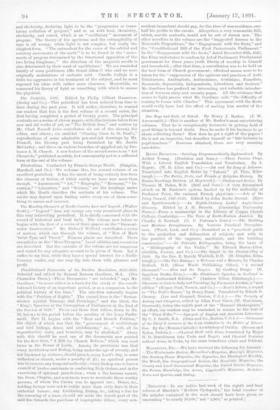Constitutional Documents of the Puritan Revolution, 16244690. Selected and edited
by Samuel Rawson Gardiner, M.A. (The Clarendon Press.)—These Documents "are intended," says Mr. Gardiner, " to servo either as a basis for the study of the consti- tutional history of an important period, or as a companion to the political history of the time." The selection naturally begins with the " Petition of Rights." The second item is the " Remon- strance against Tonnage and Poundage ;" and the third, the "King's Speeches at the Prorogation of Parliament at the End of the Session of 1628." These and those that follow, down to No. 16, bolcns to the period before the meeting of the Long Parlia- ment. Part II. begins with the "Root and Branch Petition," the object of which was that the "government of. archbishops and lord bishops, donna and archdeacons," " with all its dependencies, roots, and branches, may be abolished." Along with this should be read one of the documents now printed for the first time, ." A Bill for Church Reform," which was read twice in the House of Lords. Among its provisions was that every Archbishop and Bishop, being under the ago of seventy, and not hindered by sickness, should preach every Lord's Day in some cathedral or church, under a penalty of Li; no spiritual person was to exercise any temporal authority ; every Bishop was to have a council of twelve assistants in conferring Holy Orders, and in the exercising of spiritual jurisdiction ; when a See became vacant, the Dean, Chapter, and assistants were to nominate three worthy persons, of whom the Crown was to appoint ono ; Deans, &c., holding livings were not to reside more than sixty days in their cathedral houses; any Archbishop, Bishop, &c., taking a fine for the renewing of a lease, should set aside the fourth-part of the said fine towards the purchase of impropriato tithes ; every non-
resident incumbent should pay, for the time of non-residence, one- half his profits to the curate. Altogether, a vory reasonable Bill, which, sautatis etutandis, would not be out of season now. ' The other novelties in the volume are the " Suggested Answer to the Newcastle Propositions," the "Engagement with the Scots," and the "Constitutional Bill of the First Protectorate Parliament." In the "Engagement with the Scots," dated December 20th, 1647,. the King undertakes to confirm by Act of Parliament Presbyterial government for three years (with liberty of worship to himself and household) ; after that time, a consultation was to be held on the best form of Church government ; effectual means wore to be, taken for the "suppression of the opinions and practices of Anti- Trinitarians, Anabaptists, Antinomians, Arminians, Famelists, Brownists, Separatists, Independents, Libertines, and Seekers!' Mr. Gardiner has prefixed an interesting and valuable introduc- tion of between sixty and seventy pages. All the evidence that conies to light proves what Mr. Gardiner calls "the difficulty of coming to terms with Charles." This agreement with the Scots would really have had the effect of making him master of the situation.






































 Previous page
Previous page